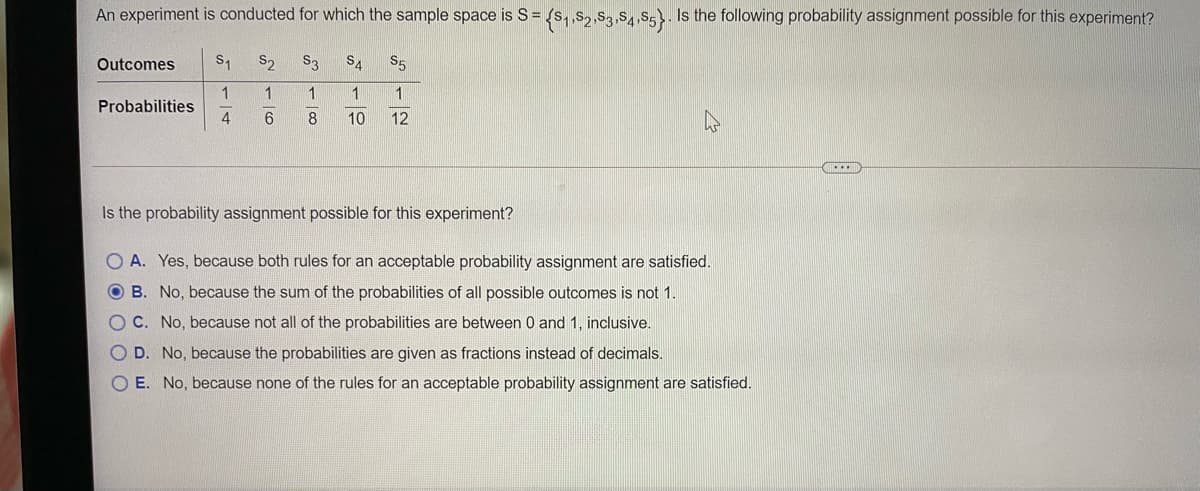An experiment is conducted for which the sample space is S= {8q,$2.S3,S4,S5}. Is the following probability assignment possible for this experiment? Outcomes S1 S2 S3 S4 S5 1 Probabilities 1 1 1 4 8 10 12 (.... Is the probability assignment possible for this experiment? O A. Yes, because both rules for an acceptable probability assignment are satisfied. O B. No, because the sum of the probabilities of all possible outcomes is not 1. O C. No, because not all of the probabilities are between 0 and 1, inclusive. D. No, because the probabilities are given as fractions instead of decimals. O E. No, because none of the rules for an acceptable probability assignment are satisfied.
An experiment is conducted for which the sample space is S= {8q,$2.S3,S4,S5}. Is the following probability assignment possible for this experiment? Outcomes S1 S2 S3 S4 S5 1 Probabilities 1 1 1 4 8 10 12 (.... Is the probability assignment possible for this experiment? O A. Yes, because both rules for an acceptable probability assignment are satisfied. O B. No, because the sum of the probabilities of all possible outcomes is not 1. O C. No, because not all of the probabilities are between 0 and 1, inclusive. D. No, because the probabilities are given as fractions instead of decimals. O E. No, because none of the rules for an acceptable probability assignment are satisfied.
Advanced Engineering Mathematics
10th Edition
ISBN:9780470458365
Author:Erwin Kreyszig
Publisher:Erwin Kreyszig
Chapter2: Second-order Linear Odes
Section: Chapter Questions
Problem 1RQ
Related questions
Question

Transcribed Image Text:An experiment is conducted for which the sample space is S= {s, s, S,,s,S5}. Is the following probability assignment possible for this experiment?
Outcomes
S1
S2
S3
SA
$5
1
Probabilities
1
1
4
8
10
12
Is the probability assignment possible for this experiment?
O A. Yes, because both rules for an acceptable probability assignment are satisfied.
O B. No, because the sum of the probabilities of all possible outcomes is not 1.
O C. No, because not all of the probabilities are between 0 and 1, inclusive.
O D. No, because the probabilities are given as fractions instead of decimals.
O E. No, because none of the rules for an acceptable probability assignment are satisfied.
Expert Solution
This question has been solved!
Explore an expertly crafted, step-by-step solution for a thorough understanding of key concepts.
This is a popular solution!
Trending now
This is a popular solution!
Step by step
Solved in 2 steps with 2 images

Recommended textbooks for you

Advanced Engineering Mathematics
Advanced Math
ISBN:
9780470458365
Author:
Erwin Kreyszig
Publisher:
Wiley, John & Sons, Incorporated

Numerical Methods for Engineers
Advanced Math
ISBN:
9780073397924
Author:
Steven C. Chapra Dr., Raymond P. Canale
Publisher:
McGraw-Hill Education

Introductory Mathematics for Engineering Applicat…
Advanced Math
ISBN:
9781118141809
Author:
Nathan Klingbeil
Publisher:
WILEY

Advanced Engineering Mathematics
Advanced Math
ISBN:
9780470458365
Author:
Erwin Kreyszig
Publisher:
Wiley, John & Sons, Incorporated

Numerical Methods for Engineers
Advanced Math
ISBN:
9780073397924
Author:
Steven C. Chapra Dr., Raymond P. Canale
Publisher:
McGraw-Hill Education

Introductory Mathematics for Engineering Applicat…
Advanced Math
ISBN:
9781118141809
Author:
Nathan Klingbeil
Publisher:
WILEY

Mathematics For Machine Technology
Advanced Math
ISBN:
9781337798310
Author:
Peterson, John.
Publisher:
Cengage Learning,

